

100 Questions to Help You Write, Publish, and Sell Your Ebook. Just a few years ago, if you wanted to be a published author you had to jump through a series of hoops involving literary agents and publishers.

Then you faced a seemingly endless wait before your book finally hit the shelves. Boy, how times have changed. Productivity Made Simple: Where to Start with GTD. GTD (or Getting Things Done) is a widely popular personal productivity and time management methodology created by David Allen and described in his book “Getting Things Done”.
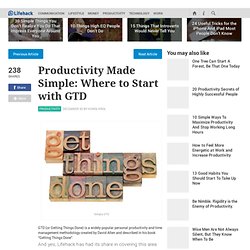
And yes, Lifehack has had its share in covering this area already. For instance, by doing a simple search on Google you can quickly find out that there are more than 6,000 pages on Lifehack that mention GTD in one way or the other. So the whole idea seems discussed enough, right? Perhaps…but it is definitely worth revisiting as we enter a new year. Consider that despite thousands of articles around the internet there is still one main problem with GTD – it’s not a methodology that’s easy to grasp. It has a learning curve and if you simply throw yourself in the middle of it you might get the wrong overall impression about the system and abandon it after just a short while. TRIZ. TRIZ (/ˈtriːz/; Russian: теория решения изобретательских задач, teoriya resheniya izobretatelskikh zadatch) is "a problem-solving, analysis and forecasting tool derived from the study of patterns of invention in the global patent literature".[1] It was developed by the Soviet inventor and science fiction author Genrich Altshuller and his colleagues, beginning in 1946.
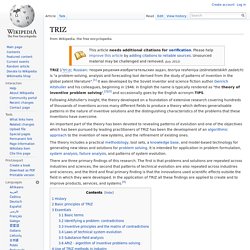
In English the name is typically rendered as "the theory of inventive problem solving",[2][3] and occasionally goes by the English acronym TIPS. Following Altshuller's insight, the theory developed on a foundation of extensive research covering hundreds of thousands of inventions across many different fields to produce a theory which defines generalisable patterns in the nature of inventive solutions and the distinguishing characteristics of the problems that these inventions have overcome. There are three primary findings of this research. §History[edit] §Basic principles of TRIZ[edit] §Essentials[edit] §Basic terms[edit]
Creativity Hack: Use TRIZ to Solve Problems and Generate Ideas. TRIZ — the Russian acronym for Theory of Inventive Problem Solving — is a toolbox of techniques for solving problems and generating ideas.
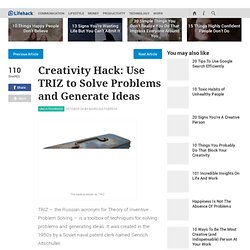
It was created in the 1950s by a Soviet naval patent clerk named Genrich Altschuller. Altschuller believed that it was possible for people to learn to become inventors. He studied hundreds of thousands of patents and found that there are only about 1,500 basic problems to be solved. In addition, all of these problems can be solved by applying one or more of 40 universal principles. Although TRIZ was originally developed in order to help engineers to solve technical problems and create new products, it can be applied to many different areas, such as education, the law, public policy, your small business, and so on. How can I increase my income? 60 Small Ways to Improve Your Life in the Next 100 Days.
Contrary to popular belief, you don’t have to make drastic changes in order to notice an improvement in the quality of your life.

At the same time, you don’t need to wait a long time in order to see the measurable results that come from taking positive action. All you have to do is take small steps, and take them consistently, for a period of 100 days. Personal Goal Setting - Goal Setting Tools from MindTools. Planning to Live Your Life Your Way Learn how to set effective personal goals.
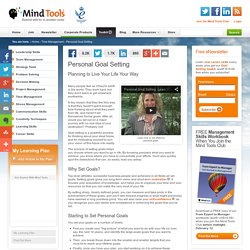
Many people feel as if they're adrift in the world. They work hard, but they don't seem to get anywhere worthwhile. A key reason that they feel this way is that they haven't spent enough time thinking about what they want from life, and haven't set themselves formal goals. After all, would you set out on a major journey with no real idea of your destination? 120 Ways to Boost Your Brain Power. Here are 120 things you can do starting today to help you think faster, improve memory, comprehend information better and unleash your brain’s full potential.

Solve puzzles and brainteasers.Cultivate ambidexterity. Use your non-dominant hand to brush your teeth, comb your hair or use the mouse. Write with both hands simultaneously. Switch hands for knife and fork.Embrace ambiguity. Learn to enjoy things like paradoxes and optical illusions.Learn mind mapping.Block one or more senses. Readers’ Contributions Dance! Contribute your own tip! There are many, many ways to keep our brains sharp. 8 Harsh Truths that Will Improve Your Life. They say life is what we make of it.
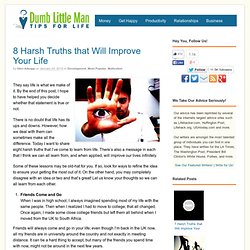
By the end of this post, I hope to have helped you decide whether that statement is true or not. There is no doubt that life has its ups and downs. However, how we deal with them can sometimes make all the difference. Today I want to share eight harsh truths that I’ve come to learn from life. There’s also a message in each that I think we can all learn from, and when applied, will improve our lives infinitely. Some of these lessons may be old-hat for you. Friends will always come and go in your life; even though I’m back in the UK now, all my friends are in university around the country and not exactly in meeting distance. Important Lesson:There are an abundance of amazing people out there for you to meet and build relationships with. You Won’t Always Get What You Want I remember one Christmas when the only thing I had asked for was some second hand turntables for DJ’ing.
Important Lesson: Not everyone is always going to like you, and that’s fine.